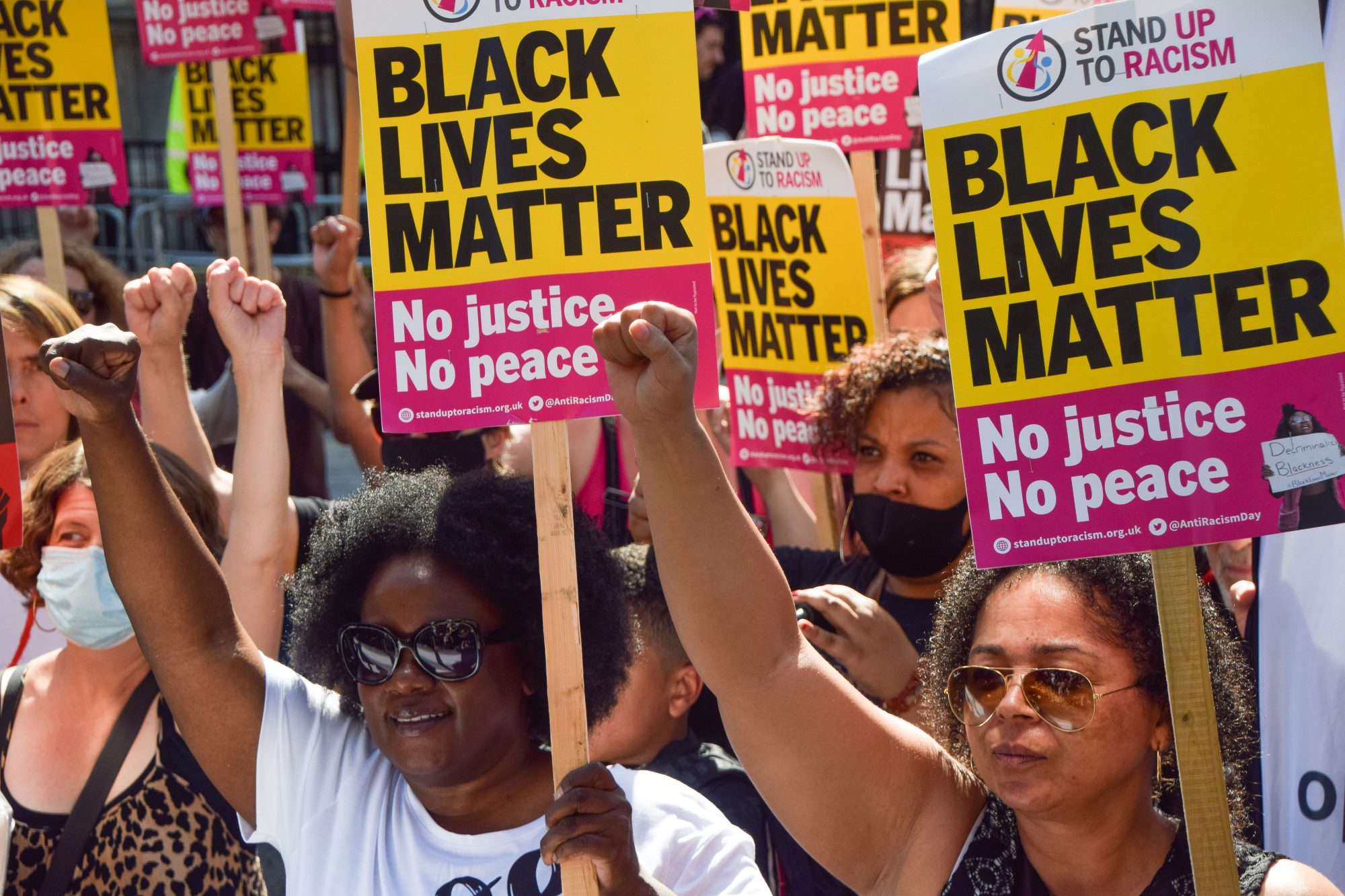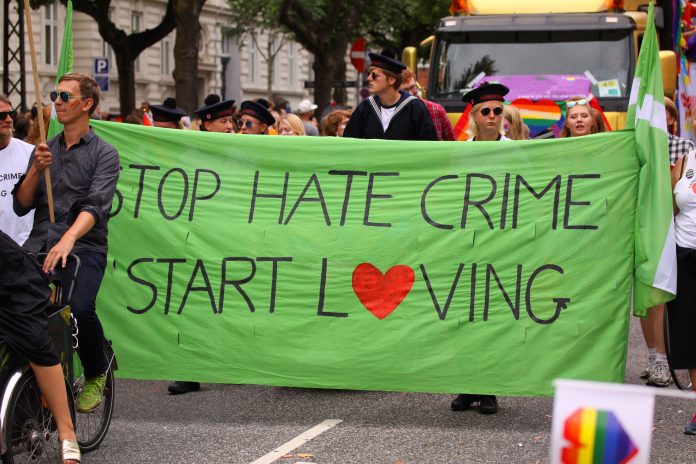In the wake of National Hate Crime Awareness week, it is time to review the policies and safeguards in place to protect and support those who experience hate crimes across the United Kingdom
Using the National Hate Crime Awareness database, newsletters, previous calls to action, and other resources, we explore the meaning of a hate crime, the national networks in place to support victims and how the UK government is tackling hate crimes.
Here, you can find information on support available for victims of hate crimes, along with what needs to be done to make the services as efficient and safe as possible.
“Where does tackling hate crime currently sit on the national, regional and local agenda?”[1]
According to Stop Hate UK: “The number of Hate Crimes recorded by police in England and Wales has doubled in the last five years, but it is offset by a fall in the number of prosecutions.”
This change is a clear cause for concern.
What constitutes a hate incident or crime?
Hate incidents and crimes are any crimes that are targeted at a person due to an underlying prejudice or hostility towards that person.
This can be due to:
- Disability
- Race or ethnicity
- Religion or belief
- Sexual orientation
- Gender identity (transgender, non-binary)
This sort of hate can occur both in-person and online. When hate incidents are deemed a criminal offence, they become what is known as a hate crime. Said crimes can be committed against a person or property and any person can be a victim of a hate crime. With this, any criminal offence has the ability to be a hate crime if it was carried out due to hostility or prejudice based on any of the factors listed above.
When a criminal offence is classed as a hate crime, due to the Criminal Justice Act 2003, the judge has the opportunity to impose a tougher sentence on the perpetrator.
So, is a potentially tougher sentence stopping hate crimes? The simple answer is no.
Why have Hate Crimes increased in 2020/21
With reported hate crimes at an all-time high, we need to look at why. Looking at the 2021 Hate Crime statistics, released as of last week, we can see a consistent increase in attacks over the last 6 years. This can partly be explained by acknowledging improvements made in recording crime by the police, paired with an increase in awareness surrounding hate crime and how to report it.
We saw a substantial increase across nearly all demographics of those affected by hate crimes in 2020/21. Despite the pandemic, there was a:
- 7% increase in hate crimes based on sexual orientation
- 9% increase in hate crimes based on disability
- 3% increase in hate crimes based on Trans identity.
“Stop Hate UK believes this is an underrepresentation of the experiences of people from these communities”.[2] Many are still not reporting crimes, and with areas such as Greater Manchester not included in the statistics, these figures do not even represent the true scale of hate crimes across the UK.
Research has shown that incidents such as terrorist attacks, the COVID-19 pandemic and Brexit negotiations have all created spikes in recorded hate crimes. These numbers can’t be ignored.

The cost of hate crimes
No one should have to live with the fear and anxiety that comes with experiencing a hate crime or being part of a group vulnerable to these kinds of attacks.
With Hate Crimes being motivated entirely by who the victim is, what they believe in or what they stand for, the personal cost can be monumental and detrimental to mental health.
One person, speaking about their experience, said: “It’s destroyed my life, really. I don’t even go out.”[3]
A 2018 project on the impact of hate crimes on victims conducted by Her Majesty’s Inspectorate of Constabulary and Fire & Rescue services (HMICFRS), illustrated the variety of emotions that follow such a personal and vindictive attack. The project reported that victims felt “shock, anger, confusion and isolation” and that these impacts had long-lasting effects on their daily lives.
The issues behind fluctuating hate crime statistics
According to the UK Government website, as of 2021, police-reported religious hate crimes fell by 18%. Although on the surface this can show the country moving in a positive direction towards reducing religiously motivated hate crimes, this is not the case.
Stop Hate UK state that they “are hearing a different picture from faith groups” about the prevalence of religiously motivated crime.
Equally these crimes can be recategorised or “hidden within Race motivated incidents”. This group have been promoting the importance of cataloguing each individual motive behind all reported hate crimes in order to get a clearer picture.
Protection
Victims of hate crimes and incidents require a level of support that is not always available across the United Kingdom. According to HMICFRS ‘police forces don’t always give victims enough information about support groups’ there appears to be a lack of empathy given to those who fall victim to hate crimes.
It is so important that the first point of contact for those who have fallen victim to a hate crime receive the right care and sensitivity that the situation demands. The police – as the most likely first contact need to have a more intensive training process, HMICFRS noted that ‘people are more likely to report any further incidents if they are confident that the police will understand and listen to them’.[4]
Where to find the support you need
The choice to report a Hate Crime or incident to the police is a personal one that some choose not to make. There are a number of ways to report a hate crime to the police either on the phone or in person.
Other options available to those who wish not to contact the police but still wish to access some level of support:
- 0800 555 111
- Call anonymously with information about crime.
- Run by the charity Stop Hate UK for immediate advice and support.
- ‘Stop Hate UK provides independent, confidential and accessible reporting and support for victims, witnesses and third parties.'[5]
Victim Support: (24/7 support):
- 0808 16 89 111
- Live chat: https://www.victimsupport.org.uk/help-and-support/get-help/support-near-you/live-chat
- A 24/7 live chat service that operates every day of the year offering specialist immediate support.
- LGBT+ Hate Crime Helpline: 020 7704 2040
- National LGBT+ Domestic Abuse Helpline: 0800 999 5428
- Offers support to LGBT+ people who have experienced hate crime, domestic abuse or sexual violence
- Anti-Muslim Hate Crime centre
- 0800 456 1226
- info@tellmamauk.org
-
An independent and confidential support service for those who face anti-Muslim hatred and prejudice across the United Kingdom. Options to report through: Telephone, Email, SMS, Facebook or Twitter.
Where does tackling hate crime stand on the Governmental agenda?
With hate crime still having such an impact on society, a key question to ask is, where does this stand in the list of priorities for the UK government?
Each year the National Hate Crime Awareness group invites statements of support from across the social and political spectrum – community leaders, faith leaders, and politicians.
The organisation was given statements of support, from both the Prime Minister and key Cabinet members, between 2012 to 2018. There appeared to be copious political support for the attempt to stop hate crime.
With Black Lives Matter protests and marches holding mainstream attention, the UK Government established the Commission on Race and Ethnic Disparities, under Tony Sewell. Created to investigate race and ethnic disparities in the UK, the report declared that there is no evidence that systematic racism still exists. The report conceded that there is still “outright racism still existing in the UK”, but proposed that this is not the fault of the UK Government – distancing decision-makers from responsibility.
The Government commissioned report also claimed that the UK “should be regarded as a model for other white-majority countries”. When taking into account that in 2021, 74% of all recorded hate incidents were racially motivated, it is clear that more needs to be done to curb racism in the United Kingdom.
References
- https://172430notohatecrime.wordpress.com/2021/03/03/17-24-30-nationalhcaw-1184819-march-newsletter/
- https://www.stophateuk.org/news-events/
- https://www.justiceinspectorates.gov.uk/hmicfrs/wp-content/uploads/hate-crime-what-do-victims-tell-us.pdf
- https://www.justiceinspectorates.gov.uk/hmicfrs/wp-content/uploads/hate-crime-what-do-victims-tell-us.pdf
- https://www.stophateuk.org/
- https://assets.publishing.service.gov.uk/government/uploads/system/uploads/attachment_data/file/925968/hate-crime-1920-hosb2920.pdf











